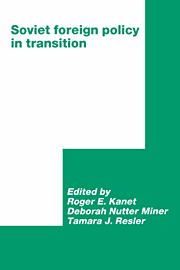Book contents
- Frontmatter
- Contents
- List of tables
- List of contributors
- Preface
- Introduction
- Part I The Soviet Union and the international political system
- Part II The Soviet Union and Europe
- Part III The Soviet Union and the developing world: global trends
- Part IV The Soviet Union and the developing world: regional and country case studies
- 8 Soviet policy in Central America during the Gorbachev period
- 9 The Soviet reassessment of socialist orientation and the African response
- 10 Soviet policy in the Middle East: Gorbachev's imprint
- 11 The implications of perestroika for the Third World, particularly Asia
- 12 The Soviet Union and Indochina
- 13 Gorbachev's Southeast Asia policy: new thinking for a new era?
- 14 The impact of Gorbachev's new thinking on Soviet policy toward South Korea
- Part V Conclusion
- Index
11 - The implications of perestroika for the Third World, particularly Asia
Published online by Cambridge University Press: 05 February 2012
- Frontmatter
- Contents
- List of tables
- List of contributors
- Preface
- Introduction
- Part I The Soviet Union and the international political system
- Part II The Soviet Union and Europe
- Part III The Soviet Union and the developing world: global trends
- Part IV The Soviet Union and the developing world: regional and country case studies
- 8 Soviet policy in Central America during the Gorbachev period
- 9 The Soviet reassessment of socialist orientation and the African response
- 10 Soviet policy in the Middle East: Gorbachev's imprint
- 11 The implications of perestroika for the Third World, particularly Asia
- 12 The Soviet Union and Indochina
- 13 Gorbachev's Southeast Asia policy: new thinking for a new era?
- 14 The impact of Gorbachev's new thinking on Soviet policy toward South Korea
- Part V Conclusion
- Index
Summary
Over the past six years the policies of perestroika and new thinking of Soviet General Secretary Mikhail Gorbachev have shaken the entire world, including the countries of the Third World. These countries, of course, are far from homogeneous, although they do share some common essential features, especially the wide spectrum of underdevelopment. Consequently, the implications of Soviet perestroika and new thinking for Third World countries are largely similar, although they do have marked variations. This impact is primarily centered on the external aspects of perestroika, what Gorbachev himself has categorized as new thinking.
The purpose of the present chapter is to specify the implications of perestroika for the countries of the Third World. The focus here is on identifying general patterns, as well as those patterns that are specific to Asia. The starting point of the analysis is an overview of the background of Soviet relations with the Third World. Perestroika in the USSR has developed in stages, as have external perceptions of the process. Hence, this chapter examines the perceptions of perestroika and new thinking held by Third World countries, especially those in Asia. The emphasis is first on understanding the nature of Gorbachev's Third World policy, then on its effects on the global role of developing countries themselves, and finally on the foreign policy postures of Asian states in particular. The domestic situation in various Third World countries is also given consideration.
- Type
- Chapter
- Information
- Soviet Foreign Policy in Transition , pp. 217 - 235Publisher: Cambridge University PressPrint publication year: 1992

